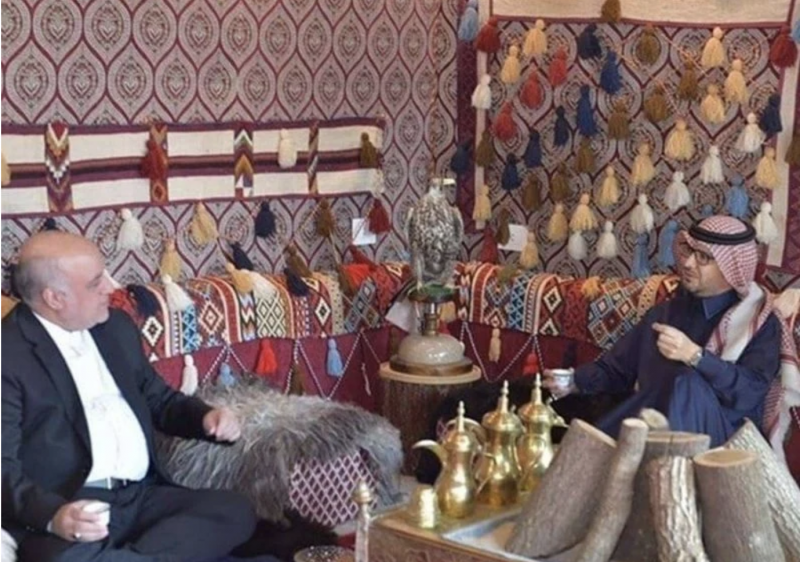
Saudi ambassador to Beirut Walid Boukhari receives his Iranian counterpart Moujtaba Amani at his home in Yarze on Monday. (Credit: Saudi embassy's website X)
On Monday, Saudi Arabia’s ambassador to Beirut Walid Bukhari expressed satisfaction following his meeting with his Iranian counterpart Mojtaba Amani.
In Riyadh’s perspective, the Iranians have transitioned from being perceived as a “threat to peace and stability” to becoming players motivated by their goodwill toward the Lebanese.
This shift has been unfolding since the reconciliation agreement between Tehran and Riyadh, formalized in Beijing in March 2023, and appears to have endured the regional turmoil stemming from the Oct.7 events.
This growing rapport holds the potential to contribute to the resolution of Lebanon’s presidential stalemate, knowing that any breakthrough necessitates approval from Hezbollah, Iran’s local ally, and Saudi Arabia, the country’s long-standing financial supporter.
When Hamas carried out its Oct.7 attack against Israel, triggering Israel’s destructive war in the Gaza Strip, the pro-Iranian resistance axis significantly undermined the normalization process between Tel Aviv and Riyadh, which had appeared to be advancing at the time.
The war also stirred up tensions in the region, sparking activity in previously dormant fronts in Iraq, Yemen and along the Syrian-Jordanian border.
Consequently, the fate of the March 2023 agreement seemed uncertain.
“Monday’s visit is significant because it shows that the process of rapprochement remains in force,” said political scientist Karim Bitar. “This suggests that we could be on the verge of a breakthrough, as in-depth dialogue between these two regional powers could pave the way for progress on the region’s issues.”
Saudi Arabia is actively seeking to increase its influence in the region, while decreasing its reliance on the United States.
Meanwhile, Iran is striving to improve relations with its neighbors to mitigate tensions amid an indirect confrontation with Israel.
However, it’s crucial to note that this doesn’t signify the end of rivalry between the two powers or an alignment of their foreign policies.
“The Saudis are not closing the door on an agreement with Israel,” said Michael Young, editor of Diwan, the blog of the Malcolm H. Kerr Carnegie Middle East Center.
“Nevertheless, Saudi Arabia is insisting on Israeli concessions to the Palestinians, and they are seeking assurances from the Americans to bolster their position in the face of Iran,” he added.
‘A new stage for the region’
The Saudi-Iranian cooperation persists, particularly concerning the Yemeni issue. Following years of intense war in Yemen against Houthi rebels, supported by Tehran, Saudi Arabia has gradually withdrawn, aiming to find a political solution, notably through the agreement reached in Beijing.
However, the Yemeni group gained prominence again with the onset of the Israel-Hamas war. Similar to other groups close to Tehran, it adhered to the “unity of fronts” principle to support Hamas, attacking Israeli or Israel-bound ships and significantly impeding maritime traffic around the strategically vital Bab al-Mandeb strait.
According to media leaks, the Houthis received support in these operations from Hezbollah, whom Iran purportedly urged to enhance its presence in Yemen. This has drawn the ire of the US, which has conducted numerous strikes against the Yemeni rebels, but not from Saudi Arabia.
“Riyadh is distancing itself from the events involving the Houthis,” said Young.
In a noteworthy development, reports from Syrian and pan-Arab media suggest that a Saudi delegation visited Damascus last week to facilitate the reopening of the kingdom’s embassy in Syria. Diplomatic ties between the two nations were severed 12 years ago, following the violent crackdown on pro-democracy demonstrators by Syrian President Bashar al-Assad and Tehran-affiliated groups, including Hezbollah.
“The Saudis and Iranians have made a strategic decision, not a tactical one, to cooperate,” said Young. “This marks a new stage for the region.”
The pertinent question is: Will this new phase have repercussions on the Lebanese scene? “Probably,” said Young.
Nevertheless, it’s important to note that despite the rapprochement, tensions persist between Riyadh and Hezbollah, particularly concerning the party’s alleged involvement in smuggling Captagon to the Gulf states.
“There may also be internal friction among the players aligned with each of the two camps, which could complicate their cooperation on the Lebanese issue,” Young added.
However, this does not seem to be the case — at least for the moment — based on Bukhari’s intense diplomatic activity.
Indeed, the Saudi ambassador has recently been extensively traveling on behalf of the quintet involved in the Lebanese issue (France, United States, Saudi Arabia, Qatar and Egypt), indicating a potential political return of Saudi Arabia to the local scene, after several years of withdrawal following the rise of Iranian influence.
Moreover, according to L’Orient-Le Jour information, the Lebanese presidential election was discussed during the meeting between Bukhari and Amani.
Riyadh seems to have realized that the quintet’s efforts would be in vain without an Iranian green light, something it had refused to acknowledge in the past.
However, also according to information obtained by L’Orient-Le Jour, the majority of the meeting was focused on regional issues.
“The Saudis’ top priority is Yemen,” said Bitar, noting that Yemen could pose a much greater security risk for the kingdom than Lebanon.
“Building on this observation, we can entertain the possibility that Saudi Arabia might ease its stance on the Lebanese scene in exchange for Iranian concessions in Yemen,” he said. “Unless military developments in Lebanon alter priorities.”
This article was originally published in L'Orient-Le Jour. Translated by Sahar Ghoussoub.